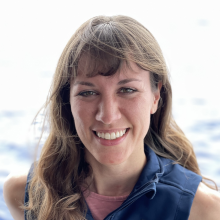
Ashton Jackson
Tell us about your work/research. What kinds of things do you do?
As a student of hydrography, I get to explore beneath the ocean's surface and recreate it on charts so that mariners around the world can navigate safely. Oceanographers, geologists, archaeologists, and other scientists can also take a closer look at my data to make their own discoveries. I like to think of hydrographers as one part Jacques Cousteau, one part Alan Turing (and maybe one part MacGuyver when things go wrong). When we're offshore we use these amazing multibeam sonar systems to discover what's below - it's always an adventure. Back on land, the data we've collected always starts as an enigma, but with some work, we uncover amazing images of underwater shipwrecks, mountain ranges, and even sub-bottom features. Some hydrographers even use aircraft or autonomous underwater vessels equipped with sensors to extend their reach and get data more efficiently. The field of autonomous technology is growing very quickly now, and is going to be a huge advantage for mapping the 80% of the ocean that is unexplored!
What sparked your initial interest in your career?
Any native West Texan like myself will tell you that the haboobs and Death-Valley-dry days that define our thirsty mesa have a definite effect: there is nothing more fascinating to a Panhandler than water. For me, the wide horizons and dusty Llano Estacado — where there ain’t much life and what’s there all lies in plain sight — stirred a desire to explore regions of undiscovered depths and vitality. The stars at night are big and bright deep in the heart of Texas, but the nearest ocean was 600 miles from my hometown; so, for many years, I turned my interest in exploration towards space. I earned my B.S. in Electrical Engineering from Texas A&M University under the encouragement of a close mentor at NASA. Then, in my first job out of college, I took on an interesting client that built and deployed their own underwater deep-sea vessels. I’d stumbled upon the most extreme technology on Earth and I was captivated! This realization was significant, as it shifted my interests from the stars to the seas. Naturally, I still find space captivating, but I love that the oceans are readily accessible and hold so much potential for discovery!
Who influenced you or encouraged you the most?
I was blessed to be surrounded by wonderful mentors because my family has a multi-generational agricultural engineering company. I spent a lot of time at the plant, and everyone there was a willing, patient teacher. My folks were especially phenomenal about encouraging my love of tinkering: I had a constant supply of old electronics to take apart and educational toys to put together. And, as hardworking people, my parents find their moments of peace by loading up the Subaru, turning off everything but the radio, and escaping into a national or state park. They taught me to value nature and its offering of growth, inspiration, and reflection. I really lucked out.
What element of your work/study do you think is the most fascinating?
Last fall, I was part of a University of Southern Mississippi engineering cruise that involved testing two AUV's (Autonomous Underwater Vessels) in the Gulf of Mexico. I learned so much about mobilizing and deploying AUV's... right up until we had to take shelter from Tropical Storm Olga!
What other jobs led to your current career?
My first job out of college was in technical sales where a few of my clients were deep-sea engineering companies - I thought it'd be a great way to learn more about various industries, and it was! Later, I had a technology developer role at my family's agricultural engineering company where I gained experience with networking, telemetry, and industrial automation. Surprisingly, one of the things that have helped set my resume apart is a summer internship I did with the US Congress. I think that when you're in a STEM field, it's vital to be able to communicate your ideas and discoveries well and apply them beyond your field.
What are your degrees and certifications?
M.S. Hydrographic Science and IHO CAT A Certification @ University of Southern Mississippi (Graduate in 2021)
B.S. Electrical Engineering + Russian Minor @ Texas A&M University (2013)
What are your hobbies?
I'm no adrenaline junkie, but I do love to be out in nature: kayaking, hiking, skiing, riding horses, scuba diving, or even biking or walking along the beach with my dog are nice ways to relax, though some of those things are more accessible than others on the Gulf Coast. In the spirit of living in the rural south, I bought a banjo about a year ago, but keep forgetting to practice!
How did you get involved with the Ocean Exploration Trust?
I kind of hate to admit this, but I started following NautilusLive.org after seeing a video of a stubby squid on Reddit. Coincidentally, my university then partnered with the Ocean Exploration Cooperative Institute along with OET. I couldn't resist applying for the ROV internship!
What advice would you give someone who wants to have a career like yours?
If you're like me and have a lot of interests, it might take a while to figure out where they all converge. I recommend keeping an ongoing list of "Things that fascinate me" and "Things that drain me." By doing this, I realized that I'd been consistently feeding my interest in technology, but had assumed it was too far-fetched to include my passions for nature, exploration, and public policy in my daily work. Boy, was I wrong! I never would have imagined I'd voluntarily go back to school to get a master's degree, but it is helping me specialize so that I have opportunities to experience more daily variety and offer greater value to the world.
Expeditions
Ashton participated in the following Ocean Exploration Trust expeditions:
